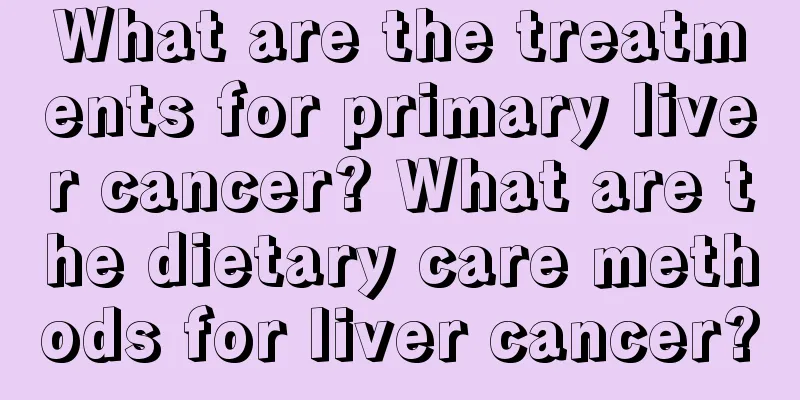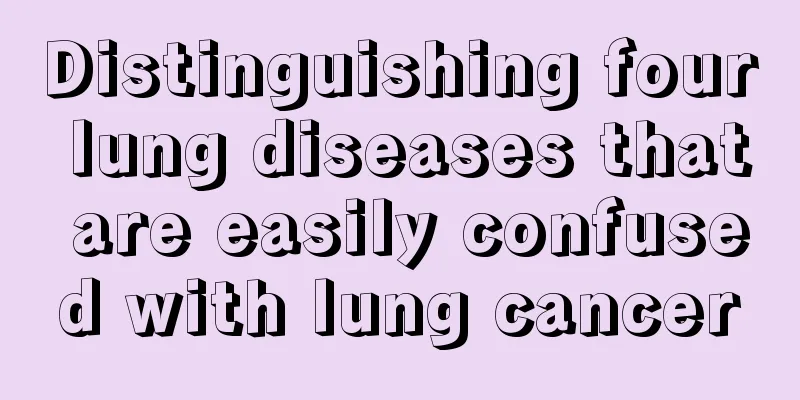What are the treatments for primary liver cancer? What are the dietary care methods for liver cancer?

|
What are the treatments for primary liver cancer? There are no obvious symptoms in the early stage of liver cancer. Generally, when it is discovered more obviously, it is in the late stage, and the treatment is more difficult. Therefore, liver cancer must be treated early. At present, there are many methods for treating liver cancer clinically, and their indications are different, and the effects are also very different. What are the treatment methods for primary liver cancer? The introduction is as follows. 1. Liver transplant surgery 2. Liver resection surgery Liver resection surgery is a radical treatment for liver cancer patients by Navy hepatobiliary experts. It is still the preferred method for curing early and middle-stage liver cancer in the medical field, both in the past and now. Liver resection surgery is based on the patient's best prognosis. During the operation, necrotic and cancerous tumors in the liver are accurately removed, while minimizing the patient's trauma. The Navy's hepatobiliary surgery department's authoritative liver resection technology has incomparable advantages, including less trauma to patients, complete tumor resection, fast recovery, and fewer postoperative complications. 3. Radiofrequency ablation technology Radiofrequency ablation is an advanced technology that integrates human and machine operation. It is an interventional technology that accurately locates and causes coagulative necrosis of local cancerous cells to block the spread of liver cancer cells. It causes little damage to other liver tissues and adjacent tissues, so it is more suitable for patients with small liver cancer and multiple liver cancers. The intraoperative trauma is small and the recovery is fast. After the operation, the patient strictly follows the doctor's instructions and observes for a period of time before being discharged from the hospital. This method reduces the pain of liver cancer patients and allows them to return to normal life in a short time. 4. Cellular Immunotherapy Liver cancer can be treated with cellular immunotherapy, which can stimulate the body's own immune system to inhibit and treat tumors. It can make up for the shortcomings of traditional surgery, radiotherapy and chemotherapy. While killing tumor cells, it regulates and restores the body's immune function, kills formed tumor cells, inhibits the formation of new tumor cells, and blocks the source of tumor recurrence and metastasis. It is the best way to treat liver cancer. 5. Radiotherapy and chemotherapy Radiotherapy is also effective in treating liver cancer. It has begun to reduce the size of the tumor to a certain extent and can alleviate the symptoms of pain. However, radiotherapy and chemotherapy are also very harmful to patients, suppressing the body's immunity and causing damage to human functions. In clinical practice, it is often combined with cellular immunotherapy for comprehensive treatment. 6. Interventional treatment It includes transcatheter arterial chemotherapy (HAI), transcatheter arterial embolization (HAE) and transcatheter embolization (TACE). Simply giving transcatheter arterial chemotherapy is not enough. Transcatheter embolization is currently the most important interventional treatment method. Indications: patients with advanced primary liver cancer who cannot be surgically removed; patients who can be surgically removed but cannot or are unwilling to undergo surgery due to other reasons (such as advanced age, severe liver cirrhosis, etc.). For the above patients, radiological interventional therapy can be used as the first choice of non-surgical treatment. 7. Ablation therapy It refers to a type of treatment method that directly kills tumors locally under the guidance of imaging technology. Currently, radiofrequency and microwave ablation and anhydrous alcohol injection are the most commonly used. Indications: For single tumors with a diameter of ≤5cm or multiple nodules within 3 with a maximum diameter of ≤3cm, without blood vessel or bile duct invasion or distant metastasis, and early liver cancer patients with liver function of Child-Pugh A or B, radiofrequency or microwave ablation is the best choice other than surgery. 8. Biological therapy and molecular targeted therapy At present, most biological treatment methods or technologies are still in the stage of research and development and clinical trials, and a small part has been applied in clinical practice. In recent years, molecular targeted drugs for the treatment of liver cancer have become a new research hotspot and have received great attention. They mainly include: anti-EGFR drugs, such as erlotinib and cetuximab; anti-angiogenic drugs, such as bevacizumab and brivanib; signal transduction pathway inhibitors, such as mTOR inhibitor everolimus (RAD001); multi-target inhibitors, such as sorafenib and sunitinib, etc. 9. Traditional Chinese Medicine Treatment It is currently believed that traditional Chinese medicine can be used as an adjuvant treatment for liver cancer, helping to reduce the toxicity of radio and chemotherapy, improving cancer-related symptoms, improving the quality of life, and potentially prolonging survival. What are the dietary care methods for liver cancer? Liver cancer is a very common disease in life. Liver cancer patients often suffer from loss of appetite. Therefore, understanding the dietary care methods for liver cancer is beneficial to the treatment of patients. The following experts will introduce the key points of dietary care for liver cancer in detail. Diet care for liver cancer: (1) Eating should be mainly soft and easily digestible food, avoid hard and spicy food, eat less fried food, and eat small and frequent meals. Avoid irritating food and food high in plant fiber, so as not to cause esophageal or gastric vein rupture and bleeding in patients with liver cirrhosis. (2) Eat a diversified diet and pay attention to food combinations to ensure that the food has good color, aroma and taste to help increase appetite. (3) Eat more fresh fruits and vegetables, drink fruit juice, and supplement vitamins. (4) Provide high-protein, high-calorie, high-vitamin, low-fat food and limit the intake of animal oil. (5) Patients with fever should drink more water to help dissipate heat. (6) For patients with ascites, sodium intake should be restricted and a low-salt or salt-free diet should be given. (7) People who vomit frequently should temporarily fast to prevent food from irritating the stomach, increasing the frequency of vomiting, and wasting physical energy. |
Recommend
What are the late symptoms of laryngeal cancer
Laryngeal cancer is a malignant tumor originating...
Be cautious when going abroad to get the cervical cancer vaccine. Going abroad to get the cervical cancer vaccine is not suitable for everyone
The "Guidelines for Cancer Screening, Early ...
Dietary knowledge during radiotherapy for nasopharyngeal carcinoma
In recent years, nasopharyngeal carcinoma has bec...
What are bladder nodules
Even if bladder nodules occur, they will not caus...
Is the cervical cancer vaccine really effective? The cervical cancer vaccine cannot prevent cancer 100%
Cervical cancer is one of the common malignant tu...
What are the current methods for treating lung cancer?
Lung cancer is the disease with the highest incid...
How to care after breast cancer surgery? 3 nursing methods after breast cancer surgery
Breast cancer is a high-incidence breast disease ...
What is the difference between cerebral infarction and cerebral infarction
In clinical practice, many diseases have very sim...
What to eat to prevent nasopharyngeal cancer
In fact, in our daily life, many diseases can be ...
How much does brain cancer treatment cost
Different methods are used to treat various brain...
If liver function is normal, it won't be liver cancer? How to prevent liver cancer better?
The liver of an adult weighs about 1,500 grams an...
Which armpit temperature is more accurate?
There is a certain temperature difference between...
What are the examination items for nasopharyngeal carcinoma
Nasopharyngeal cancer can cause great harm to peo...
How long can butter be kept in the refrigerator
Butter is a food ingredient with a very low melti...
Measures to be taken to treat laryngeal cancer
The correct measures for the treatment of larynge...









